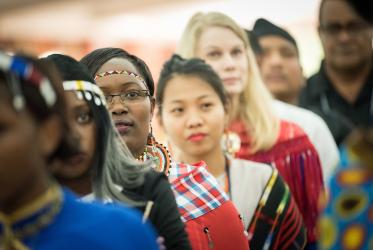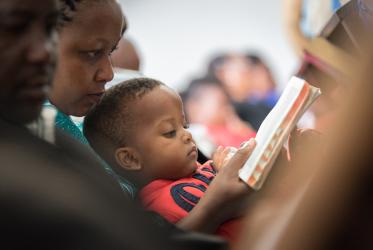By Claus Grue, WCC Communications
Violence against children was one emerging issue discussed at the Christian Conference of Asia's assembly in Jakarta, Indonesia, on 20-27 May. “It is still a sad reality in large parts of the world, but momentum to end violence against children is growing within governments and communities, amongst parents and religious leaders. This is a good thing since it takes everyone to make a change”, says Lauren Rumble, UNICEF’s chief of child protection in Indonesia.
“Even though child protection laws are in place in many countries, including Indonesia, social acceptance of violence allows it to happen. Violence against children is preventable, but it has been a dormant – and often condoned – problem with a taboo around it, a problem parents and schoolteachers have been well aware of but rarely spoke out about”, Rumble continues.
During a visit to Jakarta earlier this year, Santos Pais, Special Representative of the UN Secretary-General on Violence Against Children, praised the Indonesian government for addressing the issue in its new National Medium Term Development Plan (2015-2019). She urged the government to continue its efforts to prevent and respond to violence against children in the country and invited Indonesia to take a leading role in the region in ending violence against children.
Progressive forces under the newly elected president Joko Widodo have also started to address the issue of child marriage, which is seen as part of the problem. Seventeen percent of Indonesian girls are under 18 when they marry. There is a strong movement now in favour of raising the age-limit for marriage from 16 to 18, which would make fewer girls dependent at an early age. Lauren Rumble explains that this, in turn, may reduce the risk of exposure to domestic violence.
According to a recent UNICEF study, up to 1.5 billion children worldwide may endure some form of violence every year. Physical aggression is experienced by 7 out of 10 children. Local church congregations are seen as important partners in bringing the problem to light and addressing the issue. UNICEF has already established an experimental collaboration with the Protestant Evangelical Church in Timor (GMIT), a WCC member church in Eastern Indonesia, and more partnerships are welcomed.
Lauren Rumble explains, “We are launching a nationwide movement targeted towards parents and children, where an animated film is one powerful ingredient. Working together with more church congregations around the country would definitely increase the impact of our combined efforts.”
Rumble is hoping to get more concrete partnerships in place soon. Opportunities for a pilot project through one of the other churches among the 26 WCC-member churches in Indonesia are now being explored. At a global level, a partnership between the World Council of Churches and UNICEF has recently been developed and is about to be launched. For its implementation, Indonesia has been selected as a pilot country.
“The context of Indonesia is conducive to seeing tangible results through efforts of churches at grassroots levels. Indonesia also provides an excellent environment for inter-religious collaboration to end violence against children”, explains Frederique Seidel, special advisor on child rights at the World Council of Churches.
“The new partnership seeks to build the capacity of World Council member churches, church-related development agencies and ecumenical partners to monitor and promote children's rights within their communities and congregations. Local church congregations play a critical role in reaching the most vulnerable children with protection measures”, Seidel says.
Indonesia has one of the world’s highest reported rates of physical violence at school, according to the Global School-based Student Health Survey (GSHS) from 2007. About 40 percent of students aged 13-15 reported having been physically attacked by peers in the preceding 12 months at school, while half of all children surveyed reported bullying at school. The same survey shows that 56 per cent of boys and 29 per cent of girls in institutions, such as orphanages, rehabilitation centres, boarding schools and correctional institutions have experienced physical abuse.
“Initiatives to end violence against children, are crucial in order to respond to this reality”, concludes Seidel.
In parallel to the pilot project in Indonesia, a process is currently being developed to encourage all of the WCC’s 345 member churches to engage in child rights advocacy and child protection measures.
“The partnership with UNICEF aims to build the capacity of churches worldwide to become an effective voice in the prevention of violence against children”, Seidel explains, adding that “while UNICEF has collected strong scientific evidence on the importance of implementing children’s rights and preventing violence against children, churches have a significant theological legacy in their commitment to children’s rights”.
“Churches are often strong in their communities, and in many countries they are important opinion-leaders. Pastors are very close to the lives of people and are often the first ones to whom families describe their difficulties related to violence. By equipping churches with tools to prevent, detect and respond to violence against children, the partnership between the WCC and UNICEF aims to contribute to the prevention of violence against children worldwide”, she continues.
To ensure that children can grow up in environments free of violence requires efforts on both the local level and a policy level. The number of countries in which joint action plans will be developed between UNICEF and WCC member churches depends on available financial support. In the meantime, the new WCC programme to prevent violence against children has already mobilized church leaders in many countries who have committed themselves to sharing their best practices and joining efforts for and with children in the Pilgrimage of Justice and Peace.










